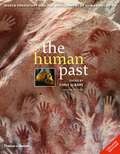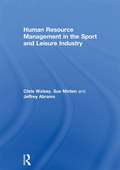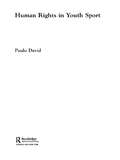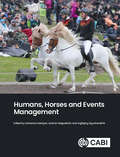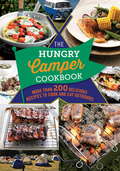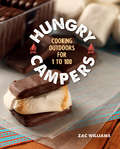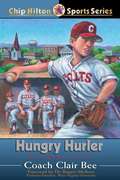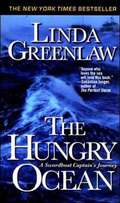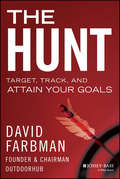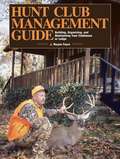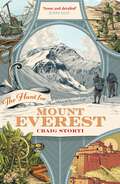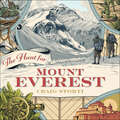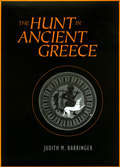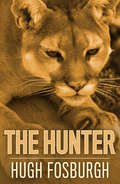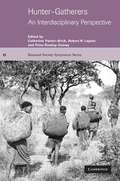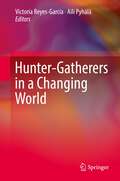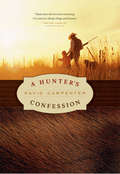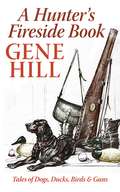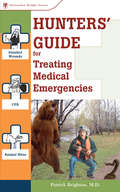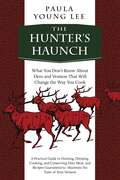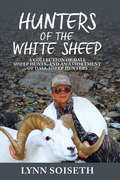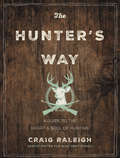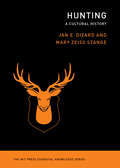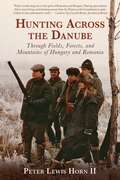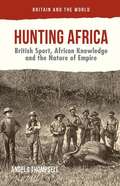- Table View
- List View
The Human Past: World Prehistory and the Development of Human Societies
by Chris ScarreTextbook on humans, from 6 million years ago to early civilizations.
Human Resource Management in the Sport and Leisure Industry
by Sue Minten Chris Wolsey Jeffrey AbramsThe sport and leisure sectors possess unique characteristics that pose particular challenges for managers and human resource professionals. The age profile of workers, seasonality, the pressure to achieve short-term results, media intrusion, wide differences in pay between elite and community levels, and the importance of competition and consumer (fan) behaviour, all combine to set sport and leisure apart from 'mainstream’ business and management. Human Resource Management in the Sport and Leisure Industry is a comprehensive and accessible introduction to HRM in sport and leisure that examines these challenges in the context of organisational structure, systems, and individual and group behaviour, encouraging the reader to develop a strategic approach to HRM, and emphasising the importance of reflective professional practice. The book explores the full range of key issues, themes and concepts in contemporary HRM, including: the labour market in sport and leisure personal skills in HRM recruitment and selection learning, training and development evaluation and performance appraisal change management coaching and mentorship. Covering private, public and voluntary contexts, the book includes a wide range of examples and cases from the real world of sport and leisure management. Each chapter also includes highlighted definitions of key concepts, review questions, summaries and learning objectives, to guide student learning and help managers develop their professional skills. Effective human resource management and development is essential for business success, and this book is therefore important reading for any student or professional working in sport and leisure management.
Human Rights in Youth Sport: A Critical Review of Children's Rights in Competitive Sport (Ethics and Sport)
by Paulo DavidDoes competitive sport respect children's human rights? Is intensive training child labour? Is competitive stress a form of child abuse? The human rights of children have been recognized in the 1989 UN Convention on the Rights of the Child, and ratified by 192 countries. Paulo David's work makes it clear, however, that too often competitive sport fails to recognize the value of respect for international child rights norms and standards. Human Rights in Youth Sport offers critical analysis of some very real problems within youth sport and argues that the future development of sport depends on the creation of a child-centred sport system. Areas of particular concern include issues of: over-training physical, emotional and sexual abuse doping and medical ethics education child labour accountability of governments, sports federations, coaches and parents. The text will be essential reading for anybody with an interest in the ethics of sport, youth sport, coaching and sports development.
Humans, Horses and Events Management
by Katherine Dashper Guðrún Helgadóttir Ingibjörg SigurðardóttirHorses are perhaps the most common non-human animal to feature in planned events, but although there is considerable research on equestrian sport, there is virtually none on equestrian events. This book begins to address this gap, using the National Championships of the Icelandic Horse as an extended case study to explain in depth the process of managing an event, as well as the larger theoretical implications of events management. Drawing on diverse viewpoints and theoretical perspectives, the book draws wider comparisons to connect events management to larger themes in the social sciences, such as human-animal relations; nationalism; place branding; event impacts; event experience; and inclusion and exclusion. The book is a contribution to two fields. In relation to human-animal studies, it focuses on how the Icelandic horse breed is marketed and celebrated through top-tier competition; whereas from an events management perspective, it considers the role of the event in community building, the practical and theoretical aspects of running a sustainable equestrian event, and the issues that arise in multispecies event contexts. This book: - Uniquely draws together events management and human-animal studies. - Is formed from empirical research conducted by a multinational team of events management and tourism researchers. - Uses a single, extended case study to explore a range of themes and issues, both empirically and theoretically. A valuable resource for researchers of events management, human-animal studies and tourism, this book also provides an in-depth look at end-to-end events management for industry professionals.
The Hungry Camper Cookbook: More than 200 delicious recipes to cook and eat outdoors (The Hungry Cookbooks)
by SpruceA camping cookbook like no other, The Hungry Camper not only gives more than 200 quick, cheap and delicious recipes that all the family will love, but also includes helpful checklists on what to bring along, how to prepare for big family meals, and invaluable camping tips for a stress-free trip. With chapters dedicated to making sure you have a hearty breakfast, making the most of a campfire with barbecue dishes, one pot simplicity and a host of salads, sides and snacks aplenty, camping food never has to be boring again.Including recipes from treacle and mustard beans, grilled sardines with salsa and goulash with caraway dumplings, to coconut dahl, hot barbecued fruit salad and creole pineapple wedges, each recipe is easy to make in a campsite for even the most novice cook, tired from a day's adventure.
Hungry Campers: Cooking Outdoors for 1 to 100
by Zac WilliamsMouthwatering recipes for campfire cooking—perfect for scout groups, youth groups, families, and friends—by the author of Little Cowpokes Cookbook.Hungry Campers offers a handy selection of simple and easy to-make recipes that can be used by individuals and groups to prepare meals for all types of outdoor adventures. Simple recipes for breakfasts, lunches, dinners and desserts are complemented by menu plans for weeklong camps, multi-day backpacking trips and even overnighters, making it easy to get outdoors.Each chapter focuses on a specific type of camp cooking, including campfire cooking basics, large groups, Dutch oven, backpacking and recipes for aspiring wilderness gourmets. Helpful tips provide outdoor cooking wisdom for those just getting started as well as new ideas for experienced campers.Recipes for roughing it include: Stadium Brats, Sunnyside Sandwiches, Irish Breakfast, Stovetop Soda Bread, Peanut Butter Sandwich Bar, Beef Goulash, Cheese &‘n&’ Mac, Chicken and Dumplings, Firemen Enchiladas, Pioneer Pizza, Pumpkin Cobbler, Trout Florentine, Hiker&’s Cereal, Icebox Ice Cream, and more.
Hungry Hurler: The Homecoming (Chip Hilton Sports Series #23)
by Clair BeeWhen Valley Falls is plagued with young vandals and a few violent incidents, Doc Jones and the mayor ask Chip for help. His solution: a summer sports program that should inspire youth to do something worthwhile for the town in which they live.
The Hungry Ocean: A Swordboat Captain's Journey
by Linda GreenlawThe term fisherwoman does not exactly roll trippingly off the tongue, and Linda Greenlaw, the world's only female swordfish boat captain, isn't flattered when people insist on calling her one. "I am a woman. I am a fisherman. . . . I am not a fisherwoman, fisherlady, or fishergirl. If anything else, I am a thirty-seven-year-old tomboy. It's a word I have never outgrown."Greenlaw also happens to be one of the most successful fishermen in the Grand Banks commercial fleet, though until the publication of Sebastian Junger's The Perfect Storm, "nobody cared." Greenlaw's boat, the Hannah Boden, was the sister ship to the doomed Andrea Gail, which disappeared in the mother of all storms in 1991 and became the focus of Junger's book.The Hungry Ocean, Greenlaw's account of a monthlong swordfishing trip over 1,000 nautical miles out to sea, tells the story of what happens when things go right--proving, in the process, that every successful voyage is a study in narrowly averted disaster. There is the weather, the constant danger of mechanical failure, the perils of controlling five sleep-, women-, and booze-deprived young fishermen in close quarters, not to mention the threat of a bad fishing run: "If we don't catch fish, we don't get paid, period. In short, there is no labor union."Greenlaw's straightforward, uncluttered prose underscores the qualities that make her a good captain, regardless of gender: fairness, physical and mental endurance, obsessive attention to detail. But, ultimately, Greenlaw proves that the love of fishing--in all of its grueling, isolating, suspenseful glory--is a matter of the heart and blood, not the mind. "I knew that the ocean had stories to tell me, all I needed to do was listen." --Svenja Soldovieri
The Hunt
by David FarbmanDo you consider yourself a hunter? If you have you ever dated, played sports, or held a job, then your answer should be yes. We are always hunting--trying to track down and take the things we want, the things that will make our life bigger, better, safer; more satisfying, exciting, and just plain fun.In The Hunt, serial entrepreneur, hunter, and OutdoorHub founder David Farbman offers a way of thinking about work, life, and our connection with the world based upon the ancient discipline of hunting. The Hunt will inspire anyone striving for more to think like hunters--with poise, concentration, and skill; to identify their targets; and, with focus, determination, and satisfaction, to achieve those goals.Specifically, The Hunt shows how to:Get a bigger, clearer picture of your life and goals, and discover things about yourself and your ability that you've never noticed or seen beforeGain the hunter's special skills at observation and perception, to understand your environment;Learn "predatory consciousness" - the full understanding of your prey, whether business partners or competitors, so you can predict their actions;Harness and leverage every opportunity to obtain your desired outcomes and inspire your best thinkingFully understand where to pick battles, and where not to "hunt" at all.The principles of The Hunt will give you a clearer, sharper lens for seeing the world and shaping your role in it. You'll make better decisions, form stronger alliances, build better strategies, target bigger wins, and uncover more opportunities. Best of all, you will become a true hunter when you know who you are, what you want, and how to get what you're hunting for.
Hunt Club Management Guide: Building, Organizing, and Maintaining Your Clubhouse or Lodge
by J. Wayne FearsIf you ever wanted to create your own hunting club, this book is for you.In Hunt Club Management Guide, wildlife management consultant J. Wayne Fears teaches you how to take your dreams of owning and operating your own hunt club and make them reality. From locating the acres you'll build on to hanging your final set of antlers on the wall, Fears touches on everything you will need to start your own club.In addition to revealing the step-by-step process of organizing and building a great club, Fears also provides insight into maintaining a successful club that will last for decades. This insight includes tips to help:Generate a top-notch wildlife management programPlant and manage food plotsCreate effective rulesDraft contracts and agreementsDevelop quality deer management techniquesAttract deer to your landFrom club by-laws to game management plans, clubhouse to land acquisition, the Hunt Club Management Guide will be your manual for establishing an enjoyable and thriving hunt club.
The Hunt for Mount Everest
by Craig StortiThe height of Mt. Everest was first measured in 1850, but the closest any westerner got to Everest during the next 71 years, until 1921, was 40 miles. The Hunt for Mt. Everest tells the story of the 71-year quest to find the world's highest mountain. It's a tale of high drama, of larger-than-life characters-George Everest, Francis Younghusband, George Mallory, Lord Curzon, Edward Whymper-and a few quiet heroes: Alexander Kellas, the 13th Dalai Lama, Charles Bell. A story that traverses the Alps, the Himalayas, Nepal and Tibet, the British Empire (especially British India and the Raj), the Anglo-Russian rivalry known as The Great Game, the disastrous First Afghan War, and the phenomenal Survey of India - it is far bigger than simply the tallest mountain in the world. Encountering spies, war, political intrigues, and hundreds of mules, camels, bullocks, yaks, and two zebrules, Craig Storti uncovers the fascinating and still largely overlooked saga of all that led up to that moment in late June of 1921 when two English climbers, George Mallory and Guy Bullock, became the first westerners-and almost certainly the first human beings-to set foot on Mt. Everest and thereby claimed the last remaining major prize in the history of exploration.With 2021 bringing the 100th anniversary of that year, most Everest chronicles have dealt with the climbing history of the mountain, with all that happened after 1921. The Hunt for Mt. Everest is the seldom-told story of all that happened before.
The Hunt for Mount Everest
by Craig StortiThe height of Mt. Everest was first measured in 1850, but the closest any westerner got to Everest during the next 71 years, until 1921, was 40 miles. The Hunt for Mt. Everest tells the story of the 71-year quest to find the world's highest mountain. It's a tale of high drama, of larger-than-life characters-George Everest, Francis Younghusband, George Mallory, Lord Curzon, Edward Whymper-and a few quiet heroes: Alexander Kellas, the 13th Dalai Lama, Charles Bell. A story that traverses the Alps, the Himalayas, Nepal and Tibet, the British Empire (especially British India and the Raj), the Anglo-Russian rivalry known as The Great Game, the disastrous First Afghan War, and the phenomenal Survey of India - it is far bigger than simply the tallest mountain in the world. Encountering spies, war, political intrigues, and hundreds of mules, camels, bullocks, yaks, and two zebrules, Craig Storti uncovers the fascinating and still largely overlooked saga of all that led up to that moment in late June of 1921 when two English climbers, George Mallory and Guy Bullock, became the first westerners-and almost certainly the first human beings-to set foot on Mt. Everest and thereby claimed the last remaining major prize in the history of exploration.With 2021 bringing the 100th anniversary of that year, most Everest chronicles have dealt with the climbing history of the mountain, with all that happened after 1921. The Hunt for Mt. Everest is the seldom-told story of all that happened before.(P) 2020 Hodder & Stoughton Ltd
The Hunt in Ancient Greece: Judith M. Barringer
by Judith M. BarringerHunting and its imagery continued to play a significant role in archaic and classical Greece long after hunting had ceased being a necessity for survival in everyday life. Drawing on vase paintings, sculpture, inscriptions, and other literary evidence, Judith Barringer reexamines the theme of the hunt and shows how the tradition it depicts helped maintain the dominance of the ruling social groups. Along with athletics and battle, hunting was a defining activity of the masculine aristocracy and was crucial to the efforts of the Athenian elite to control the social agenda, even as their political power declined. The Hunt in Ancient Greece examines descriptions of hunting in initiation rituals as well as the ideals of masculinity and adulthood such rites of passage promoted. Barringer argues that depictions of the hunt in literature and art also served as striking metaphors for the intricacies of courtship, shedding light on sexuality and gender roles. Through an exploration of various representations of the hunt, Barringer provides extraordinary insight into Athenian society.
The Hunter
by Hugh FosburghThe Hunter, first published in 1950, is a lean novel in the Hemingway tradition that captures the essence of the big-game hunt. Set in the southern Rocky Mountains, the book focuses on Monk Taylor, living in semi-isolation with Billy Trott, a native, and a half-crazed old woman, only lives to track big-game while avoiding obligations to others, including the woman, Marge, who loves him. Monk agrees to guide two easterners on a lion hunt, but in a fit of rudeness, Monk ends the hunt but is soon himself lying injured and horseless in a gully. Saved, and brought back to Marge by Billy Trott, Monk fantasizes about marriage, but when he realizes he has nothing to give her or anyone else, he once again sends her away.
Hunter-Gatherers: An Interdisciplinary Perspective
by Robert H. Layton Peter Rowley-Conwy Catherine Panter-BrickAnalyses of the ecology, biology and society of past and present-day hunter-gatherers are at the core of this interdisciplinary volume. Since the seminal work of Man the Hunter in 1968, new research in these three areas has become increasingly specialized, and the lines of communication among academic disciplines have all but broken down. This volume aims to reestablish an interdisciplinary debate, presenting critical issues commanding an ongoing interest in hunter-gatherer research, covering the evolution and history, demography, biology, technology, social organization, art, and language of diverse groups. As a reference text, this book will be useful to scholars and students of social anthropology, archaeology, biological anthropology, and human sciences.
Hunter-gatherers in a Changing World
by Victoria Reyes-García Aili PyhäläThis book compiles a collection of case studies analysing drivers of and responses to change amongst contemporary hunter-gatherers. Contemporary hunter-gatherers' livelihoods are examined from perspectives ranging from historical legacy to environmental change, and from changes in national economic, political and legal systems to more broad-scale and universal notions of globalization and acculturation. Far from the commonly held romantic view that hunter-gatherers continue to exist as isolated populations living a traditional lifestyle in harmony with the environment, contemporary hunter-gatherers - like many rural communities around the world - face a number of relatively new ecological and social challenges to which they are pressed to adapt. Contemporary hunter-gatherer societies are increasingly and rapidly being affected by Global Changes, related both to biophysical Earth systems (i. e. , changes in climate, biodiversity and natural resources, and water availability), and to social systems (i. e. demographic transitions, sedentarisation, integration into the market economy, and all the socio-cultural change that these and other factors trigger).
A Hunter's Confession
by David CarpenterA Hunter's Confession tells the story of hunting in David Carpenter's life, including the reasons he once loved it and the reasons he no longer pursues it. When he was a boy, Carpenter and his father and brother would head out along the side roads and into the prairie marshlands searching for duck, grouse, and partridge. As a young man, he began skulking around the bushes with his hunting buddies and trudging through groves of larch, alpine fir, and willow in search of elk. Later, hunting became a form of therapy, a way to ward off melancholy and depression. In the end, as a result of a dramatic experience after shooting a grouse, Carpenter gave up hunting for good.Winding through this personal narrative is Carpenter's exploration of the history of hunting, subsistence hunting versus hunting for sport, trophy hunting, and the meaning of the hunt for those who have written about it most eloquently. Are wild creatures somehow our property? How is the sport hunter different from the hunter who must kill game to survive? Is there some sort of bridge that might connect aboriginal hunters to non-aboriginal hunters? Why do many hunters feel most fully alive when they
A Hunter's Fireside Book: Tales of Dogs, Ducks, Birds, & Guns
by Gene HillFor decades, Gene Hill's articles and books have captured the spirit of the outdoors in a way that inspires and entertains millions of readers. A Hunter's Fireside Book captures the essence of the life of a sportsman and explores the full spectrum of the hunter's experience: sunrises in the duck blind, an unforgettable hunter's moon, the camaraderie of men who know the pleasures of being wet and cold and a little bit lost.
Hunters' Guide to Treating Medical Emergencies
by Patrick BrightonDiscover prevention and treatment remedies for everything from gun shot wounds to gastrointestinal disorders in Hunters' Guide to Treating Medical Emergencies. Whether out for a morning deer hunt or on a week-long safari, hunters will appreciate the sometimes humorous presentation of how to best treat illness or injury when miles from help.
The Hunter's Haunch: What You Don?t Know About Deer and Venison That Will Change the Way You Cook
by Paula Young LeeA new way to look at hunting and deer meat that anyone who owns a venison cookbook must read!Is a doe better eating than a buck? Is hanging really necessary? Why can't venison be aged? Will soaking in milk make that gamy taste go away? The Hunter's Haunch provides straightforward and fascinating answers for these and other questions that every hunter-cook has faced, delving into myths, folklore, hunting history, and modern culinary science in order to explain why certain techniques still work and others don't.Many wild game cookbooks offer recipes for venison chili, venison burgers, venison sausage, and other solutions that make tough and gamy meat edible. By contrast, The Hunter's Haunch aims to rethink the entire process so that rescuing tough meat never becomes necessary in the first place. Focusing on the relationship of the hunt to the rhythms of nature, The Hunter's Haunch examines the deer as a living creature in the wild, showing how the skills of the hunter affect its treatment in the kitchen, and ultimately how the venison tastes when served at the table.Covering the history of deer hunting, practical lessons in game anatomy, and indispensable tips for dressing and prep, The Hunter's Haunch is an essential read for anyone who hopes to transform their quarry into the best possible venison.
Hunters of the White Sheep: A collection of Dall Sheep Hunts, and an assortment of Dall Sheep Hunters
by Lynn SoisethThe experience of an alpine hunt for the golden-crowned King of the Alaska Alpine, can be a life-changing event for both the hunter and the hunted. It is part of the mystique of sheep hunting-that the ‘sport' learns as much about himself and his capabilities, as he learns about the hunt. In Hunters of the White Sheep you will encounter an eclectic collection of hunters and their backstories as they hunt for the golden-horned rams. Read along and you will be transported to base camps in the sheep mountains by foot, airplane, ATV, jet boat, and bicycle. Once at the base camp, the hunters forgo mechanized transportation and revert to shoe leather as they pursue the white rams over wind-swept ridges, frightening chasms, chilly-blue glaciers, and sometimes, surprisingly gentle hills. Although much hunting information, such as techniques and locations can be gleaned by reading the stories carefully, this is not intended to be a how-to-hunt sheep book.
The Hunter's Way: A Guide to the Heart and Soul of Hunting
by Craig Raleigh“Craig Raleigh puts hunting into modern perspective, combining higher sensibilities and his firsthand insight into the hunting world to gently illuminate a part of human nature that was, and still is, among the purest of human endeavors.” —Jim Shockey, award-winning writer and host of Jim Shockey’s Hunting Adventures and UnchartedA thoughtful appreciation of hunting and a celebration of the outdoors that illuminates the hunter’s psyche, role, and influence on our culture."As we began to set foot in the outdoors we didn’t expect to learn something beyond where the deer were running or where the ducks were flying. Once we realized what these creatures really wanted, it was the opening of truth for us as hunters."A long-time hunter and fisherman and senior writer at Wide Open Spaces, Craig Raleigh has spent most of the last forty-five years of his life trying to find that elusive Holy Grail of hunting, that unimagined outdoor reality where one’s training, instinct, and experience converge into extraordinary bliss and accomplishment. He is the first to admit, that this does not entail the capture of a deer or an ever-evasive pheasant. It is the freedom to give back to the outdoors as much as one takes from it. For hunters, a life lived in the outdoors is massively rewarding and offers non-stop pleasures. It comes with the love of camaraderie, choice, and reward, and provides a deep appreciation for the nature world.The Hunter’s Way is his meditative and philosophical journey into the soul of a hunter. Divided into four parts that mirror the hunting experience—the background, the preparation, the hunt, and the harvest—it addresses the paradox of hunting as conservationism, ruminates on the failures and successes of hunting as sport and as a way of life, and reveals how hunting influences our society.As Raleigh explains, the hunt is so much more than the kill. Most often, the hunter leaves the woods and fields empty-handed. Rather, the beauty of hunting is in the experience itself. As a hunter, you are constantly looking for clues. Yet in nature, signs are changeable, confusing, and never the same the second time. A captivating synthesis of On Trails, Norwegian Wood, and Shop Class as Soulcraft, The Hunter’s Way is a literary reflection and love letter to the value of hunting as both sport and way of life.
Hunting: A Cultural History (The MIT Press Essential Knowledge series)
by Jan E. Dizard Mary Zeiss StangeThe history of hunting, from Stone Age hunter-gatherers to today&’s sport hunters.Hunting has a long history, beginning with our hominid ancestors. The invention of the spear allowed early humans to graduate from scavenging to actual hunting. The famous cave paintings at Lascaux show a meticulous knowledge of animal behavior and anatomy that only a hunter would have. This volume in the MIT Press Essential Knowledge series traces the evolution of hunting, from Stone Age hunting and gathering to today&’s regulated sport hunting. Humans have been hunting since we became human—but did hunting make us human? The authors consider and question the &“hunting hypothesis of human origins,&” noting that according to this theory, &“hunting&” meant hunting by men. They explore hunting in the Stone Age and how, beginning some ten thousand years ago, the spread of agriculture led to the emergence of empires and attempts by elites to monopolize hunting. They examine the democratization of hunting in the American colonies and how hunters decimated, but then, in the twentieth century, rallied to save game animals from extinction. They describe how some European and postcolonial societies have managed wildlife and hunting, consider the difficulties of living with abundant wildlife—even as many nongame species are disappearing—and trace the implications of the increasing participation of women in hunting for the future of hunting.
Hunting Across the Danube: Through Fields, Forests, and Mountains of Hungary and Romania
by Peter Lewis Horn IIThis is the first book written in English about two of Eastern Europe's premier hunting destinations. The book is animated by the author's desire to share this little-known sporting paradise with educated hunters. The chapters detail game he has hunted over the past three decades, including stag, boar, roebuck, bear, wolf, chamois, capercaillie, pheasants, mouflon sheep, and ducks in areas that regularly produce world-class trophies and yet remain unknown to even the most experienced hunters. The hunting culture and traditions of Romania and Hungary, which figured so prominently in the Austro-Hungarian Empire, profoundly influenced the development of European, and international, hunting. By sharing the latest facts about the finest hunting areas, hunting seasons, and firearms and equipment, the author hopes to awaken an appreciation for all the best that Hungary and Romania offer sportsmen.
Hunting Africa: British Sport, African Knowledge and the Nature of Empire (Britain and the World)
by Angela ThompsellThis book recovers the multiplicity of meanings embedded in colonial hunting and the power it symbolized by examining both the incorporation and representation of British women hunters in the sport and how African people leveraged British hunters' dependence on their labor and knowledge to direct the impact and experience of hunting.
